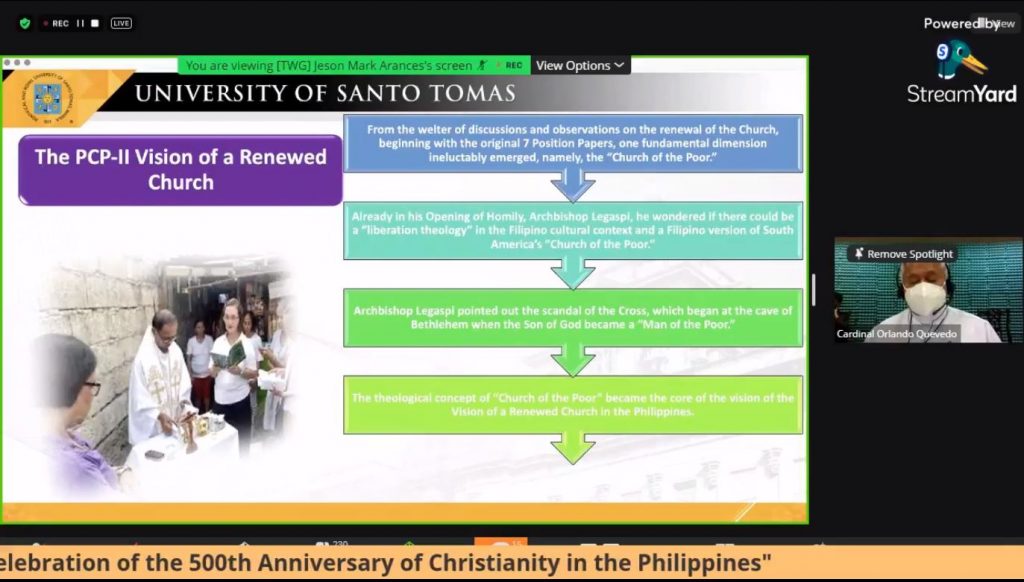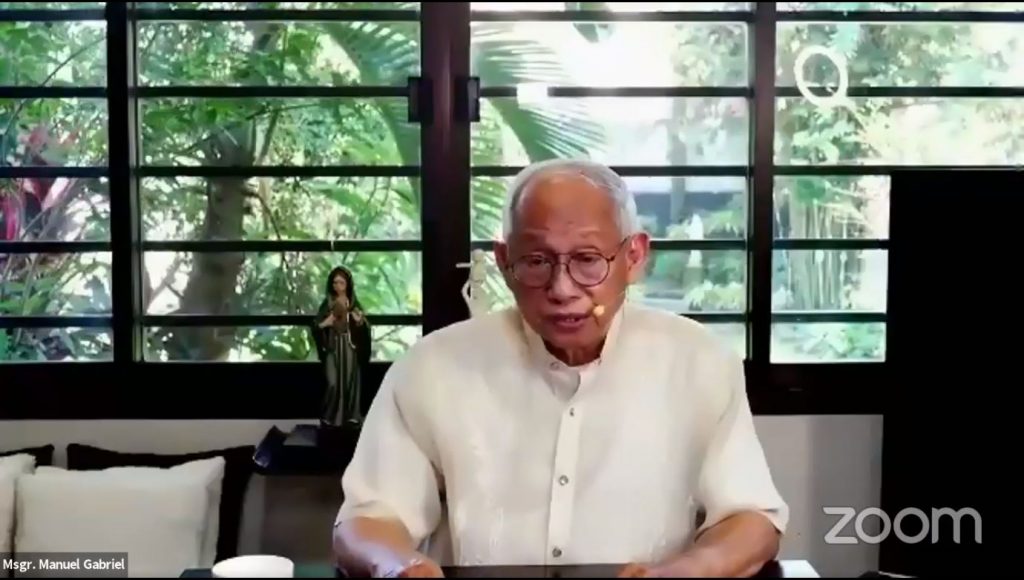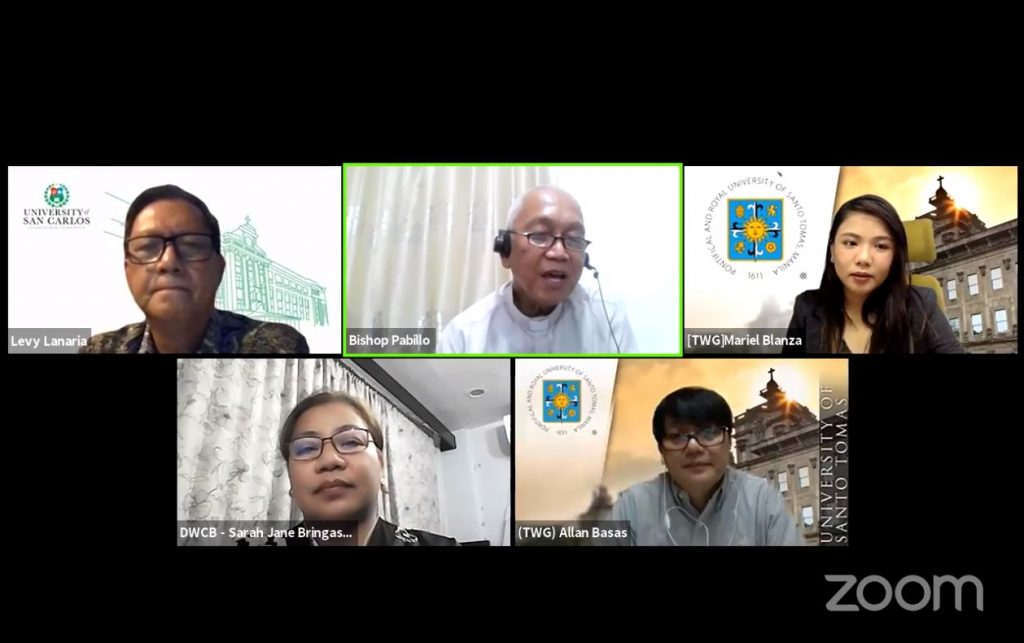The UST Graduate School – Theology Cluster, the Center for Theology, Religious Studies and Ethics, and the Institute of Religion hosted the 6th installment of the Leonardo Legaspi Lecture Series on Theology, Religious Studies and Ethics on October 28-29, 2021 via livestream.
The speakers focused on the renewal of the Church in the Philippines, embodied in the Church of the Poor, Basic Ecclesial Communities, and Dialogue with Muslims and Indigenous peoples.



In his keynote lecture, Archbishop of Cotabato Orlando Cardinal Quevedo, O.M.I., D.D. recalled the contribution of Archbishop Legaspi to the Second Plenary Council of the Philippines (PCP II), a brainchild of Archbishop Legaspi while serving as the president of Catholic Bishops Conference of the Philippines, as well as its continuing challenge and relevance in the present and in the future.
Moreover, Archbisop Quevedo said the the concept of the “Church of the Poor” became the core of the vision of the “Vision of a Renewed Church in the Philippines”, focusing on Jesus’ proclamation of the Kingdom to the poor, his gathering of disciples, his kenotic and redemptive Paschal mystery, and on the final apostolic mission of preferring the poor.
“The Church of the poor, according to the conciliate document, is a Church that embraces and practices the spirit of evangelical poverty, whose members have a special love of preference for the poor, and where the poor are not discriminated against,” Archbishop Quevedo said. “It is a Church where pastors are directly knowledgeable through pastoral exposure with the life situation of the poor and will defend their rights and condemn injustices,” he added.
Sharing the initiatives of former Marawi Bishop Bienvenido Tudtud in forging peace with the Muslim community in Mindanao, Bro. Karl M. Gaspar of the Alphonsus and Theological Mission Institute – Davao lectured on the dialogue of faith and life, the challenges and the promises for the Church’s dialogue with the Muslim and indigenous communities.
For Bro. Gaspar, one strategy that will build peace, mutual respect, and reconciliation was Inter-religious Dialogue. “By coming in together in the name of God, known as either Dios or Allah, in a dialogue of faith and life, it was envisioned that the ordinary folk would all work collectively for peace,” he said.
“Dialogue, therefore, demands a deep spirituality which enables a man to hand on to his faith in God’s live, even when everything seems to fall apart,” Bro. Gaspar added.
CBCP Episcopal Commission on Basic Ecclesial Communities Executive Secretary Msgr. Manuel Garcia Gabriel shared his reflections on the role of Basic Ecclesial Communities (BEC) as an experience of the local church in dialogue with contemporary people.
For Msgr. Gabriel, the local church must be understood, especially in the people mission, along with its embodiment: dialogue with the poor through integral human development; dialogue with cultures of Asia, which was inculturation; and dialogue with religious tradition of Asia, which was inter-faith dialogue.
“[The Basic Ecclesiastical Communities] are not mere expressions of renewal, the way PCP-II looks at it. BECs are the new experiences of being Church in dialogue with light, people, society, and ecology. BECs make the Church present in the grassroots of society. It is not an expression, but an experience of being a local Church in dialogue with contemporary people,” he said.
“Ito ay imbitasyon sa isang karanasan ng paglalakbay, kung ano ang ibig sabihin ng pananalig kay Kristo sa pagbubuo ng pamayanan,” Msgr. Gabriel added.
Lastly, Apostolic Vicariate of Taytay Broderick S. Pabillo, D.D shared his thoughts on the status of the Church as the Church of the Poor, 30 years after its proclamation in the Philippines.
According to Bishop Pabillo, the Synod on Synodality, which will be held in October 2023, will help the Church in becoming more conscious of its mission listen to the poor and the marginalized.
“Hopefully, the Synod on Synodality can be a complete step for us, Church leaders, to be evangelized by the poor by being in contact with them, by encountering them, by listening to them. We can learn more how to be Church, how to be truly Christians from the experience of the poor.” Bishop Pabillo said.
In celebration of the 500th Anniversary of Christianity in the Philippines, the theme of this event was “The Lights and Shadows of the 30 Years of the Second Plenary Council of the Philippines”.
Day 1 of 6th Leonardo Legaspi Lecture Series on Theology, Religious Studies and Ethics: https://www.facebook.com/USTreligion/videos/1559435071059534/
Day 2 of 6th Leonardo Legaspi Lecture Series on Theology, Religious Studies and Ethics: https://www.facebook.com/USTreligion/videos/574803890441892/




